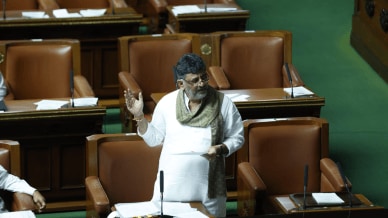A heated exchange between leaders erupted in the Karnataka Legislative Assembly between Deputy Chief Minister D.K. Shivakumar and BJP MLA Munirathna over the naming and development of a metro station in Bengaluru. The debate, which drew significant attention, highlighted the underlying political rivalry between the two leaders. While the matter at hand appeared to be a straightforward infrastructure issue, it quickly evolved into a verbal showdown, touching on themes of political credit, local representation, and civic priorities. The incident has stirred intense discussions both within political circles and among citizens invested in the city’s urban development.
The Karnataka Assembly on Tuesday witnessed high drama as Deputy Chief Minister D.K. Shivakumar and BJP MLA Munirathna clashed heatedly over the naming of a Bengaluru Metro station. The argument, which quickly escalated into a full-blown war of words, disrupted proceedings and drew the attention of both ruling and opposition members. Tensions rose as both leaders stood firm on their positions, turning what was initially a civic discussion into a political spectacle. The incident has added yet another layer to the growing list of confrontations between the Congress-led government and the BJP in the state.
The flashpoint emerged when the naming rights of a newly constructed Metro station in Bengaluru came up for debate. Munirathna, a former minister and MLA from Rajarajeshwari Nagar, accused the government of bypassing established procedures and favouring political interests. In response, Shivakumar dismissed the accusations, saying that the naming was in line with public sentiment and had gone through appropriate channels. The sharp exchange between the two quickly overshadowed other legislative matters, with several members rising to express support or disapproval.
As the verbal duel continued, Speaker U.T. Khader was forced to intervene multiple times to restore order. However, his repeated requests for calm were largely ignored, with both leaders standing their ground. The debate became so intense that it briefly halted Assembly business, forcing a rescheduling of the agenda for the day. Political analysts say this episode highlights the deep political polarisation in Karnataka and the tendency for even local issues to become arenas for party rivalry.
Outside the Assembly, Munirathna addressed reporters, reiterating his claim that the Metro station naming process was not transparent. He alleged that the government’s decision-making was politically motivated and ignored suggestions from elected representatives. “This is not just about a name; it’s about respecting democratic norms,” he said, adding that the move undermined the spirit of public consultation. Shivakumar, speaking separately, countered these statements, accusing the BJP of turning a routine civic decision into a controversy for political mileage.
The controversy has ignited debates on social media, where supporters of both leaders are voicing their opinions with equal fervour. Hashtags related to the Assembly clash trended on X (formerly Twitter), with users posting videos of the heated exchange. While Congress supporters praised Shivakumar for standing firm, BJP loyalists hailed Munirathna’s insistence on procedural fairness. The online chatter has ensured that what began as a niche issue now has statewide visibility.
In the backdrop of the argument lies Bengaluru’s rapidly expanding Metro network, which has been a point of pride and contention in equal measure. The naming of stations often carries political significance, with leaders seeking to honour figures or causes close to their constituencies. Experts point out that such naming disputes are not new, but the current confrontation has been amplified by the personalities involved. Both Shivakumar and Munirathna are known for their assertive political styles, making the clash inevitable once the matter reached the Assembly floor.
Background
The dispute centers on the metro station being built as part of the Bengaluru Metro expansion project, a development seen as critical to easing traffic congestion in the city. Munirathna, representing the Rajarajeshwari Nagar constituency, has long advocated for naming the station in a way that reflects local heritage. Shivakumar, in his capacity as both Deputy CM and Bengaluru Development Minister, has been overseeing the broader metro rollout and emphasized adherence to state-level planning norms. Tensions escalated when both leaders claimed significant roles in pushing the project forward, turning an administrative matter into a political spectacle.
Stakeholder Views
Munirathna argued passionately that the metro station’s naming must honor the local community’s cultural and historical identity, stating that constituents have voiced strong opinions on the matter. He accused the state government of overlooking grassroots voices in favor of centralized decision-making. Shivakumar countered that infrastructure projects of this scale require strategic, citywide coordination rather than constituency-level influence. He insisted that project planning followed due process and warned against politicizing urban infrastructure. Citizens and civic groups remain divided — some support Munirathna’s call for local representation, while others back Shivakumar’s broader urban policy approach.
Legal/Political Context
Infrastructure naming in Karnataka falls under guidelines set by the state’s Urban Development Department, with final approvals resting on government committees. However, political influence has historically shaped such decisions, especially when high-profile projects are involved. In this case, the Assembly debate reflects a larger political narrative — the Congress government, represented by Shivakumar, seeking to consolidate control over Bengaluru’s development, while the opposition BJP accuses it of sidelining local stakeholders. Legal experts point out that while naming disputes are not uncommon, they rarely escalate to the intensity witnessed in this session.
Environmental Impact
Although the core dispute revolves around naming, the metro expansion project itself has notable environmental implications. The new station is expected to reduce reliance on private vehicles, thereby lowering carbon emissions in Bengaluru’s notoriously congested corridors. Urban planners note that metro connectivity can also lead to denser, transit-oriented development, which, if managed well, benefits both mobility and the environment. However, improper planning around station areas could cause ecological strain, such as the loss of green cover for parking facilities or commercial development. Environmental advocates have urged leaders to focus on sustainable execution rather than political point-scoring.
Current Status
Following the heated Assembly session, the issue remains unresolved, with no final decision announced regarding the metro station’s name. The Bangalore Metro Rail Corporation Limited (BMRCL) has stated it will comply with the government’s final directive but has refrained from commenting on the political exchange. Meanwhile, both Shivakumar and Munirathna have continued to voice their positions in public forums, signaling that the dispute may persist. Political observers suggest the matter could resurface in the next legislative session or even during upcoming municipal election campaigns.
Expert Opinions
Political analysts see this confrontation as more than just a disagreement over naming — it’s a symbolic clash over control of Bengaluru’s development narrative. Dr. S. Raghavan, a political scientist, notes that such disputes often reflect underlying electoral strategies, with each leader trying to assert themselves as the face of progress in the city. Urban policy experts caution that prolonged political deadlock can delay project implementation, which ultimately affects public benefit. They argue that naming decisions should be transparent and community-driven to avoid becoming political flashpoints.
Timeline
The metro station project was first proposed in the early 2020s as part of Phase 2 of the Bengaluru Metro expansion. Munirathna began lobbying for the project’s expedited execution shortly after his election victory, citing urgent commuter needs. In mid-2024, BMRCL finalized construction plans, and discussions on the station’s name began informally. The controversy escalated in August 2025 when the matter was formally debated in the Assembly, with Shivakumar and Munirathna exchanging pointed remarks. The decision is now pending, with both political camps mobilizing public opinion.

Strong Conclusion
The clash between D.K. Shivakumar and Munirathna over the metro station encapsulates a recurring challenge in Indian urban governance — balancing community representation with centralized planning. While the dispute’s immediate outcome may center on a nameplate, its broader significance lies in the political narratives shaping Bengaluru’s growth. As the city grapples with mounting infrastructure demands, such confrontations risk slowing progress. Ultimately, the citizens’ need for efficient, sustainable transport must remain the priority, with political leaders finding common ground before rivalries derail much-needed projects.
Party insiders suggest that the incident may strain relations between Congress and opposition MLAs further, especially as municipal elections in Bengaluru draw closer. Political strategists believe each side will attempt to leverage the episode to rally their voter base. For the BJP, it is an opportunity to portray the ruling party as dismissive of due process. For the Congress, it is a chance to project Shivakumar as a decisive leader unafraid to defend his government’s choices.
The timing of the clash is also significant, coming just weeks after other high-profile disputes between Congress and BJP leaders in the state legislature. Recent disagreements over urban development projects, budget allocations, and infrastructure delays have already polarised discussions in the House. The Metro station dispute now adds to the perception of a governance environment marked more by confrontation than cooperation.

Meanwhile, urban policy experts have urged leaders to remember the original purpose of public infrastructure projects. They warn that turning functional civic decisions into political battlegrounds could delay essential services. “Naming is symbolic, but the functionality and timely completion of projects should take precedence,” said a Bengaluru-based urban planner. He stressed that public transport expansion should be insulated from partisan fights to ensure the city’s growth remains uninterrupted.
As the Assembly prepares for its next session, political observers are watching to see whether the dispute will fizzle out or reignite. Given the personalities involved and the proximity to upcoming elections, many expect the matter to continue making headlines. For now, the Metro station naming controversy stands as a reminder of how even seemingly minor civic issues can spark major political confrontations in Karnataka’s charged legislative atmosphere.
Follow: Karnataka Government
Also read: Home | Channel 6 Network – Latest News, Breaking Updates: Politics, Business, Tech & More

